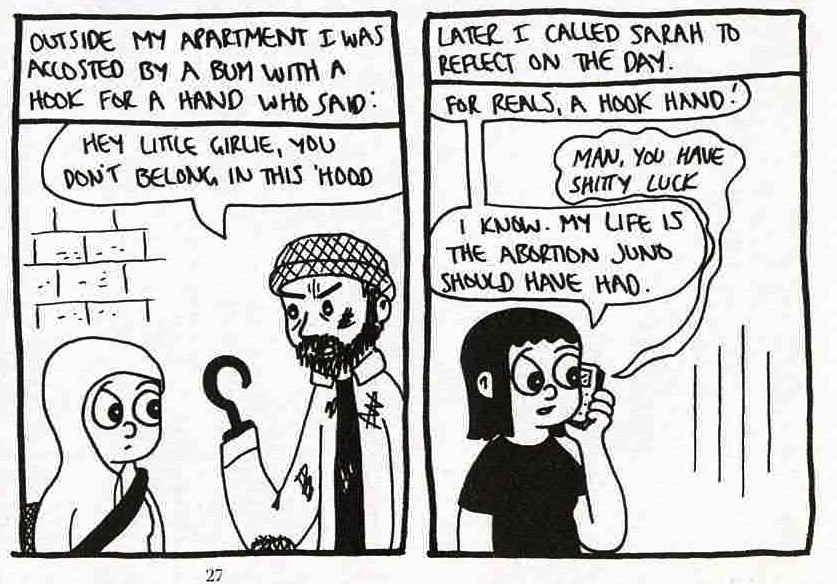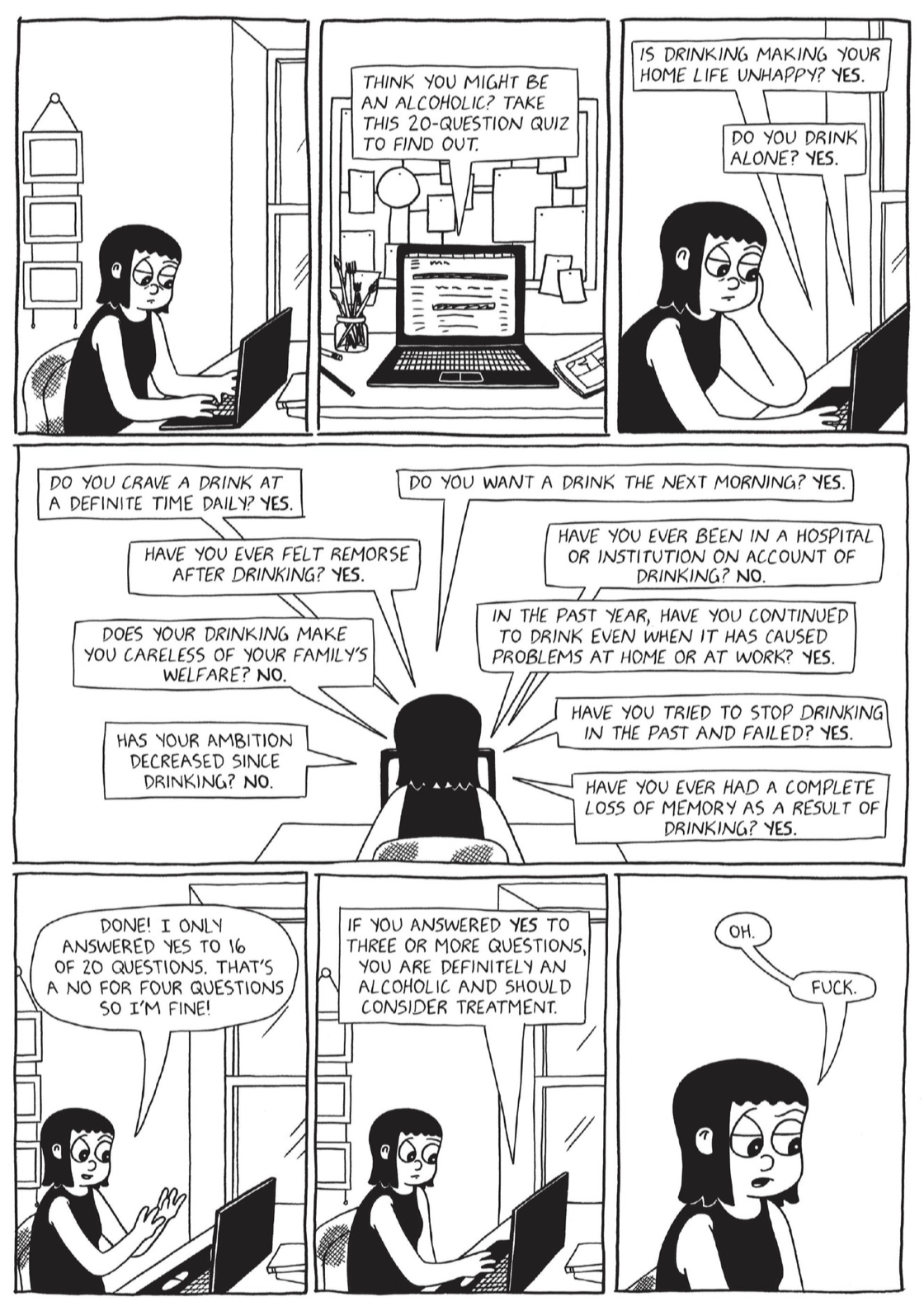I first discovered Julia Wertz in 2018 when I was living in San Francisco, working at California College of the Arts as the admin for their grad comics program. Looking back now, those were heady days that exposed me to a lot of different comic-makers I had no clue about, some of whom I now count among friends. Wertz was a guest of honor in the program’s Comics in the City speaker series, and she delivered a great talk to students about her process and approach to comics.
Right away, I appreciated her (shall we say) indelicate sense of humor. What else should one expect from an artist who named their first book The Fart Party? But her focus on speaking openly about inappropriate things resonated with me. It reminded me of the way I joke around with my closest friends, and seeing it on the page felt like an honest reflection of her lived experience.
Often when I read the dialogue in a Julia Wertz comic, I’m struck by what I think must be a near-perfect recollection of a moment in time. I’m sure Wertz is zhuzhing her memories so they come across the best they possibly can in comics form, but her genius is that her dialogue-heavy storytelling and efficient art style have a one-two punch effect on the reader that encourages them to turn the page, even if the material is hyper-specific or fairly mundane. Wertz knows how to make her very personal experiences feel universal (which they are) without beating you over the head with a message.
She can also tell jokes like this:

I don’t have any gripes about Wertz’s art style, but there are those who find her simple character designs not to their liking, and they use that to criticize all of her cartooning. To them I would suggest reading her Tenements, Towers & Trash: An Unconventional Illustrated History of New York City, a thoughtfully researched take on a city that has arguably been over-documented that shows off Wertz’s illustration specialty: architectural facades. Wertz’s drawings of people may be rudimentary, but her buildings are rendered in fine detail. TT&T is also a change of pace from her more characteristic memoir work, although her Julia avatar does make it onto a few pages.

New York occupies a special place in Wertz's cartoons. It’s the backdrop to years’ worth of autobio comics, and a source of endless wonder and inspiration, even when the subject matter delves into some of her darkest moments.

This is what Impossible People: A Completely Average Recovery Story puts at its center. It's a fresh perspective on themes that have bubbled up in Wertz comics for years, such as alcohol addiction, antisocial behavior, family relationships and the foibles of city life. I say “fresh perspective” because here you will find the clearest chronological account of the big moments that defined Wertz's alcoholism, and her turn to a new way of living.

If you follow Wertz on Instagram—which you should if you value laughter—you know that her life now is in many ways the opposite of what it was in New York: situated in a small Northern California town, surrounded by family, married and in the midst of early motherhood. Her IG feed is full of comics about this more recent reality, where joy abounds. There are still plenty of fart jokes to go around, although they now involve a toddler named Felix.
Perhaps my familiarity with those online Wertz comics takes some of the sting out of Impossible People, knowing the author lives to see a brighter day. The book in many instances is quite bleak, because that is what the material demands. Thankfully, it is also hilarious, and while it is very much a story of recovery, the details of this particular recovery have a lot to do with the power of friendship. There’s something quite moving about someone who is people-averse finding strength and redemption through their relationships.

While you still see satisfying standalone pages in Impossible People, in the way Wertz would stack gags in her earlier books, here she has embraced longer scenes, which are necessary to tell this story in the way it deserves. As I was gathering my thoughts to write this piece, I realized I couldn’t remember a lot of the beat-by-beat moments. I was relieved after reading over it again that, oh yeah, I remember all of this. It’s just that the story glides along almost without transitions from one thing to the next, lifelike.
The book is structured like this: once the specific ways addiction have impinged on Wertz's life are established, we are led into a period of mental oscillation between knowing the current reality isn’t sustainable, and fear of committing to change; eventually, enough courage is mustered to enter a three-week rehab, that sets a rocky (if ultimately successful) trajectory towards recovery.
Characters drift in and out from beginning to end, like Wertz's older brother, her friends Jennifer Phippen and Sarah Glidden, various neighbors, and a cavalcade of urban explorers. A good number of pages are dedicated to a character named Jeff, who is Wertz’s first boyfriend post-rehab. Introduced by mutual friends, they hop in the sack pretty quick. In a wholesome scene spent lounging together in a park, Wertz thinks to herself that being with someone might be something she could get used to after all.

Circumstances intercede that make this impossible. Trespasses that on their own might be forgivable both persist and worsen. Jeff uses Wertz’s admission that she has relapsed on prescription pills to lie about his own transgressions. He casually consumes alcohol in Wertz’s apartment after a hard work day without thinking much of it. When they decide to vacation together in Puerto Rico, their personality differences become unavoidable, leading to a disastrous conclusion.
After this, the book kicks into what can most broadly be described as a transitional period. Things seem to speed up as Wertz recommits to her recovery effort as well as her dedication to urban exploration. There are hiccups along the way. An unexpected relapse. Friends become parents. Others vacate the city. Wertz remains behind, but sees signs that it may be time to leave. When she puts the interconnectedness of addiction, human connection, and accountability together for herself, it feels like a sea change.

Indeed, while I’d be happy to see her return to this subject matter in the future, I don’t think she has to. Impossible People feels like the capstone of years of New York chronicles, with the benefit of enough time separating her from those experiences to allow for an earnest reflection on a bygone era. This is not to suggest that Wertz's earlier work was disingenuous, it’s just that Impossible People adopts a matter-of-fact tone to describe what it feels like to be in the throes of an alcoholic depression while maintaining just enough functionality to hide it, without getting bogged down in a woe-is-me morass. This book feels like the kind of achievement that comes only after a period of healing.
Wertz is well on her way to making her own comics universe. One day scholars may coin the term ‘Wertzian’ to describe a particular kind of self-deprecating body humor, who knows. They’d be right to do it. But it could just as easily become a term to describe insightful self-analysis. This is the tension she employs so well throughout her work. I look forward to more.







